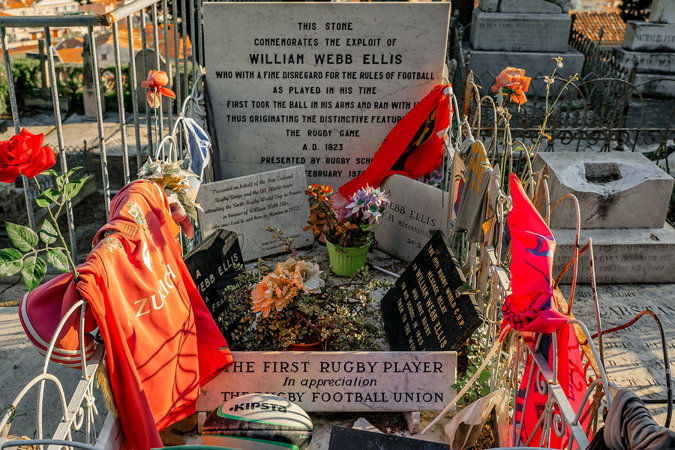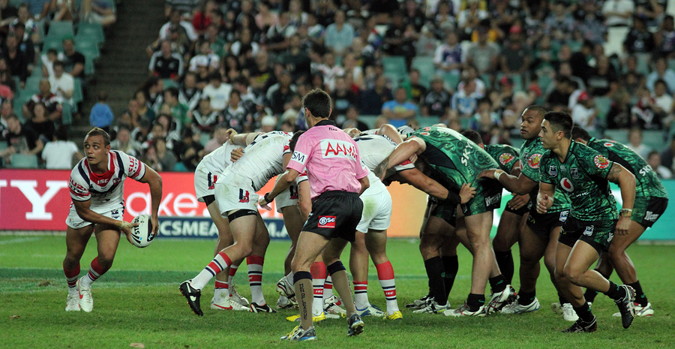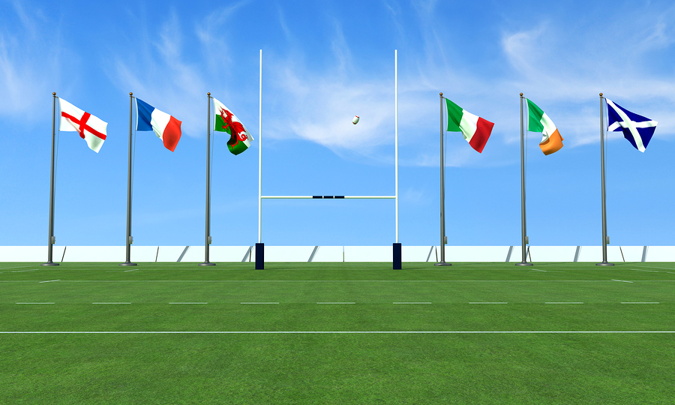Rugby Betting Sites & Offers
 Rugby is a sport that has benefited hugely in recent years from better access with more coverage than ever. Whereas Rugby League has always been a professional sport it was the move 25 years ago of Rugby Union to shift from an amateur to professional sport that has really changed the landscape around the sport. This means higher wages, more sponsorship and generally more cash in and around the sport and this has attracted high profile betting sites to take betting on Rugby to new levels.
Rugby is a sport that has benefited hugely in recent years from better access with more coverage than ever. Whereas Rugby League has always been a professional sport it was the move 25 years ago of Rugby Union to shift from an amateur to professional sport that has really changed the landscape around the sport. This means higher wages, more sponsorship and generally more cash in and around the sport and this has attracted high profile betting sites to take betting on Rugby to new levels.
Rugby betting is now more open than ever before, punters can now wager their pennies on tens to hundreds of pre-event and in play markets from 1st try scorer to betting on a the likelihood of a blood injury during a game. The increased number and profile of major Rugby leagues and tournaments coupled with more televised events and even live streaming means there also more Rugby promotions than ever before. Here we cover the very best long term and reliable rugby betting offers. Further down we look at who the best rugby betting sites are and why.
Major Rugby Tournaments



Rugby Free Bets, Money Back & Bonus Offers


If the player you pick to score the first try in both Rugby Union and Rugby League goes on to score another in 80 minutes then Betfred will double the odds on your bet.
Pre-match 1st try scorer bets only. Extra cash winnings will be credited in cash within 48 Hours and there is no upper limit or minimum stake either.
For certain Union and League matches, especially some of those broadcast on live TV, you can also sometimes get Hat-Trick Heaven. This means if your first tryscorer went on to score two more tries you can then get 3x the odds on the bet and three times the winnings.


bet365's fantastic Extra Time Extra Chance offer gives you another opportunity to win when a Rugby match goes into extra time.
When any Rugby League or Rugby Union match goes into extra time and your bet has not been settled as a winner at the end of normal time, it will remain active during extra time and be settled on the final result.
If a match is still tied after extra time/sudden death and a kicking competition is required to determine the result, the To Win market will be settled on the final result.
This offer applies to pre-match bets where a match goes into extra time in all forms of knockout Rugby and also to regular season Australian NRL, Super Rugby AU and Super Rugby Aotearoa games that play a period of golden point extra time. In-Play bets or any markets settled at half time do not apply for this offer.
So if your original bet would have been settled as a loser or a push at the end of normal time - you get an extra chance to win! T&Cs apply. Only available to new and eligible customers. Registration required.


With Boylesports if you place a bet on the 14 points ahead market on any rugby game and the team you back goes 14 points or more ahead at any stage get an instant payout even if that bet then goes on to lose.
18+. Applies to bets placed on 14 Points Ahead market. Get paid out as a winner if your team is winning by 14 points, even if they draw or lose. 80 mins only. Applies to Singles & Multiples. T&Cs apply.
Best Rugby Betting Sites and Bookmakers
Betfred
Betfred are a proper Rugby bookmaker, tons of markets, decent odds, and the most long term reliable offer in the industry with their double delight tryscorer promotion.Ladbrokes
As an all-rounder Ladbrokes cannot be beaten with good odds, big depth of market and live streaming of some games. Price boosts especially are exceptional value.Coral
Brilliant for enhancements. Before you place a bet elsewhere make sure you stop into Coral and see what lines they have boosted, it could significant increase returns.About Rugby Union and Rugby League
 In England, football will always be the most popular sport. In the rest of the United Kingdom and Ireland, however, it tends to play second-fiddle to the far more physical game of rugby. Despite the fact that many fans of one game don’t have a lot of time for the other, the two sports actually have similar origins. Yet in many ways they couldn’t be more different from each other. Football is the far more action packed game, with the ball able to move from one end of the pitch to the other in a matter of seconds. Rugby can have that sort of speed to it, but it’s far more likely for games to be seen as tactical affairs more similar in some senses to a game like chess, in which the movement of the pieces dominates the outcome.
In England, football will always be the most popular sport. In the rest of the United Kingdom and Ireland, however, it tends to play second-fiddle to the far more physical game of rugby. Despite the fact that many fans of one game don’t have a lot of time for the other, the two sports actually have similar origins. Yet in many ways they couldn’t be more different from each other. Football is the far more action packed game, with the ball able to move from one end of the pitch to the other in a matter of seconds. Rugby can have that sort of speed to it, but it’s far more likely for games to be seen as tactical affairs more similar in some senses to a game like chess, in which the movement of the pieces dominates the outcome.
The old adage about the two sports is that football is a game played by gentlemen and watched by thugs, whilst rugby is watched by gentlemen and played by thugs. Ironic, really, when you consider that rugby was created in one of the most exclusive independent schools in the country. One of the reasons why football is the more popular sport around the world is that it’s more accessible, with anyone able to start watching it and reasonably quickly understanding what’s going on. Rugby, on the other hand, is less accessible but its supporters would be quick to point out that that makes it more rewarding. If you want to have the best chance of understanding what’s going on then you’d do well to have a look at how its played, whilst understanding its history will also aid you when choosing between league and union.
History Of Rugby

The fact that the sort is often referred to as ‘rugby football’ will give you a good indication of how rugby came about in the first place. There is a story that a pupil of Rugby School named William Webb Ellis picked the ball up when he was playing football and ran with it in his arms, demonstrating a ‘fine disregard for the rules’. This has since been proven to be somewhat apocryphal, but it remains the popular view and the Rugby World Cup trophy was even given the title of the William Ellis Webb Trophy by the International Committee. Yet if that’s not the truth then what is? As with pretty much any sport, variations of a ball game had been played almost since the dawn of time, making it difficult to narrow down exactly what the origins of rugby.
The ball games that have been played over the centuries might have eventually evolved into rugby, with the likes of the Roman sport of Harpastum and the Greek Phaininda both making such claims. In reality, rugby as we know it nowadays came about because of the sense of fairness that existed at the time that it was being played. A sport referred to as football but actually nothing like the one that we now today was played in the private schools of England from the middle of the eighteenth century. That game allowed players to handle the ball but not to run with it, which is why the claim of William Ellis Webb inventing rugby by doing just that holds such power. Ball-based games were being played by schools throughout England, with each school having their own rules.
This is the moment that football and rugby began to go their separate ways, as a more formal set of rules were required to allow schools to play each other competitively. Those that liked the ‘kicking rules’ started to find ways of making them more definitive, whilst those that enjoyed the ‘carrying rules’ did the same. For some reason the rules played by Rugby School became more popular than those of the likes of Eton or Marlborough School and so they soon became the ones played most often. Soon graduates of Rugby began to introduce their friends to the game and it went from being one played exclusively by school kids to one that adults began to play too. The entire enterprise was firmed up with the formation of the Rugby Football Union in 1871.
The Split Between Rugby Union and Rugby League

The more aware of you will know that there are two forms of rugby: rugby union and rugby league. The reason for the split was, essentially, financial. Rugby had been an amateur game from the outset, but once its popularity began to spread some clubs started to offer inducements to players in order to get them to change their allegiance. The majority of clubs based in the Northern part of England were set up by industrialists and so they allowed their players to leave work early on a Saturday without losing out on their pay. Soon clubs started to pay people additional money in order to persuade them to play for them, leading to a fear from the RFU that the game would abandon its amateur roots.
This chase for professionalism is what caused the split between the two sides of the sport, with the clubs in the North of England clubbing together and creating the Northern Rugby Union in 1895. Prior to the split there was no real North / South divide in the game, with the major disagreements being over issues such as how to spot whether unacceptable practices had taken place or what an acceptable level of compensation was. As soon as the split occurred, however, the divide grew. The RFU forbade its clubs from playing against Northern Union sides and players of RFU teams were not allowed to remain on tour at the expense of his club after he’d finished playing matches, for example. It wasn’t a pleasant split, with trouble between the two sides of the argument continuing for close to a hundred years. Things only really began to thaw after Rugby Union permitted professionalism in 1995.
Rugby Union Rules and How To Play

The simple aim of rugby, as with most sports, is to score more points than the opposition. Each team features fifteen players and seven substitutes. The fifteen players are eight forwards – playing in the positions of Hooker, Prop, Second Row, Flanker and Number Eight – and seven backs – made up of Scrum Half, Fly Half, Inside Centre, Outside Centre, Wingers and Full Backs. A rugby pitch is split into three sections, made up of two goal areas and the main area. The goal areas house the goal posts, which have an ‘H’ shape to them. Teams score points in any one of four ways:
- A Try – Scored by placing the ball down in the opponent’s goal area
- A Conversion – This is a kick taken after scoring a try and requires the kicker to ensure the ball passes between the two posts and above the bar of the ‘H’ shaped goalposts
- A Penalty – If the opposition team infringes the rules then a penalty kick is awarded
- A Drop Goal – As long as the ball has bounced first, a drop goal can be scored by dropping the ball out of hands and kicking it between the posts
The scoring in rugby is simply enough, with five points being awarded for a try, two for a conversion, three for a penalty kick and three for a drop goal. A rugby game lasts for eighty minutes. Unlike football, the clock stops and starts when the ball is out of play, meaning that anyone watching can know exactly how long is left of actual game time. The match is played in two forty minute periods with a ten minute break between them. Players can leave to be treated for an injury, but if they leave the field for another reason then they can’t return.
There’s one referee in rugby and two touch judges. The latter assist the referee when it comes to decisions and letting the ref know whether the ball has gone out of play. If the ball goes out of play then it re-enters the field thanks to a line-out, which involves up to seven players lining up and trying to catch the ball. In order to assist in this one player may be lifted up. In order to pass the ball in rugby it must be thrown backwards. Any forward motion will be a foul.
Rule Differences With Rugby League

Rugby League and Rugby Union are not entirely different sports in the way that, say, football and tennis are. Yet there are enough differences in the rules to mean that they’re not spoken of as the same sport by those that love them. For starters, Rugby League has thirteen players in the starting line-up and thirteen additional substitutes.
When a player is tackled successfully in Rugby League they must drop the ball behind them and then roll it with their foot, allowing another player to pick it up. Teams can only be tackled a certain number of times and if they’ve been tackled too often then the opposition wins possession. There’s also a different scoring method in Rugby League, which is as follows:
- A Try – four points
- A Goal – Two points
- Field Goal / Drop Goal – One Point
Major Rugby Union Events and Competitions

Owing to the fact that there are two different disciplines, its rather obvious that there are numerous different competitions that would be considered to be ‘major’. There are also different tournaments within each country that plays rugby, so you’ll find that the likes of South Africa, England and France all have their own. Here we’ll look at the biggest international tournaments of Rugby Union:
- Rugby World Cup – First played in 1987, this sees the top twelve national teams from previous World Cups, as decided by the top three sides from each group, as well as eight qualifying teams go head-to-head every four years. There’s also a Woman’s Rugby World Cup, which was formed in 1991 and features the top twelve national sides.
- The Six Nations Championship – Played every year since its introduction as the Home Nations Championship in 1883, the Six Nations sees England, Ireland, Scotland, Wales, France and Italy go up against each other. When the home nations went up against each the tournament was the first international rugby union tournament anywhere in the world, becoming the Five Nations Championship when France were added in 1910. Italy became the sixth nation to join in 2000 and it has remained that way since. As with the World Cup, there’s a Women’s Six Nations that was founded in 1996 and plays out in much the same fashion.
- The Aviva Premiership – The only tournament we’ll mention that is played in club rugby is the Aviva Premiership. This is England’s top-flight club tournament and takes place over seasons every year. It is competed over by twelve teams, who move down to and up from the RFU Championship. It was first played in 1987 and has evolved in numerous ways since then to become the competition that it is today.
Rugby Union Facts & Figures
| Competition | Most Successful Team |
|---|---|
| Rugby World Cup | New Zealand |
| Women’s Rugby World Cup | New Zealand |
| Six Nations Championship | England |
| Women’s Six Nations Championship | England |
| Aviva Premiership | Leicester Tigers |
The world of Rugby Union is an uncomplicated one in terms of the tournaments that are played. There are a great deal of leagues and cups played throughout the world, but there’s not much point in going into detail about all of them when the international tournaments are the ones that most people will be interested in anyway. The table above looks at the most successful teams from the different competitions mentioned.
Major Rugby League Events and Competitions
 As with Rugby Union, practically every nation that plays rugby has a league or cup for domestic teams to play. It would take far too long to list them all, so instead we’ll just have a look at the major international tournaments as well as the one that the English top-flight clubs play in:
As with Rugby Union, practically every nation that plays rugby has a league or cup for domestic teams to play. It would take far too long to list them all, so instead we’ll just have a look at the major international tournaments as well as the one that the English top-flight clubs play in:
- Rugby League World Cup – Founded in 1954, the finals of the Rugby League World Cup involve the fourteen best teams on the planet. Initially it was played every three years, then every two. In recent times it’s been played every four years, though that’s not been happening for long and could change at any moment. As with Rugby Union, there’s also a women’s World Cup that was founded in 2000 and features eight teams. It also takes place sporadically.
- Rugby League Four Nations – It’s fair to say that Rugby League is far less regimented in when its events occur than Rugby Union is. As with the Rugby League World Cup, the Four Nations takes place sporadically. It is open to England, France, Australia and New Zealand, so an entirely different set of countries than its Union alternative.
- European Championship – Founded in 1935 this is, as the name suggests, a tournament that takes place between national teams in Europe. It began life as a Tri-Nations competition between England, Wales and France but was extended to add two more in 2003. Since 2014 the tournament has only been for four teams, of which England is not one on account of the fact that England play in the Four Nations.
- Super League – The Super League is a domestic club competition but one that is not limited simply to one nation. Instead, teams from England, France, Canada and Wales have the ability to qualify for it. Owing to the fact that only twelve teams play in the league, it is most often made up of English and French sides. It is a yearly competition that works more like a knockout tournament than as other league systems do, culminating in a Grand Final.
Rugby League Facts & Figures
| Competition | Most Successful Team |
|---|---|
| Rugby League World Cup | Australia |
| Women’s Rugby League World Cup | New Zealand |
| Rugby League Four Nations | Australia |
| Rugby League European Championship | England |
| Super League | Leeds Rhinos |





 ;
; ;
;

